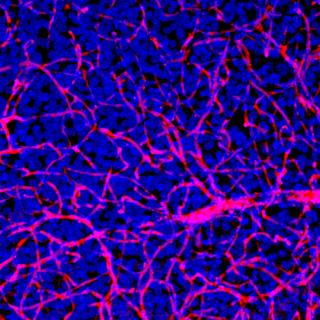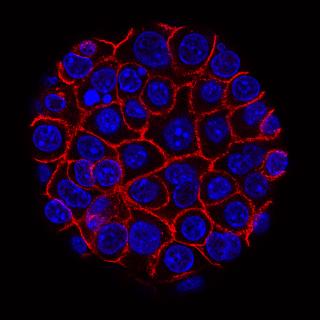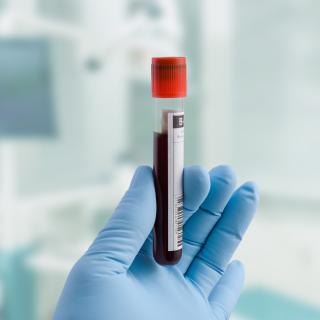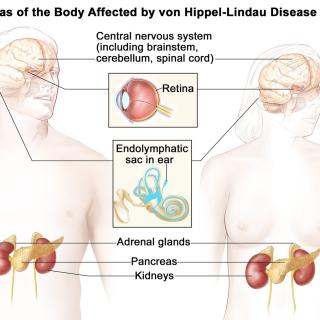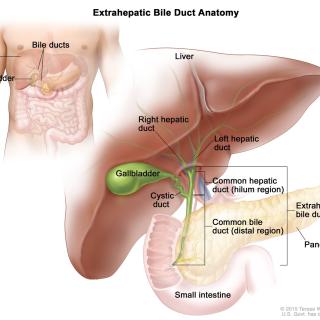News and Events
Celebrating CCR Careers: Alan Rein, Ph.D.
Alan Rein, Ph.D., is a known expert in the field of viral assembly, particularly in retroviruses like the human immunodeficiency virus (HIV). After an extensive career studying molecular mechanisms of retroviral replication and pathogenesis, he has announced his retirement.
Read MoreClinical trial studies targeted therapy for PARP-resistant tumors and chemotherapy-resistant small cell lung cancer
Anish Thomas, M.B.B.S., M.D., Lasker Clinical Research Scholar in the Developmental Therapeutics Branch, is leading a study using a berzosertib-sacituzumab govitecan combination to target ATR, a key protein involved in an alternative DNA repair pathway used by chemotherapy and PARP inhibitor-resistant cancer cells.
Read MoreImmunotherapy studied in clinical trial for glioblastoma or gliosarcoma
Adults with glioblastoma (GBM) or gliosarcoma may be eligible to participate in a clinical trial at the NIH Clinical Center. GBM and gliosarcoma tumors can suppress the immune system so immune cells cannot work effectively within the brain. Mark Gilbert, M.D., Chief of the Neuro-Oncology Branch, is leading a study to see if this suppression can be reversed with immune checkpoint inhibitors.
Read MoreClinical trial evaluates reduced dosing of cyclophosphamide to prevent severe acute graft-versus-host disease
Christopher G. Kanakry, M.D., Lasker Clinical Research Scholar in the Experimental Transplantation and Immunotherapy Branch, is leading a study that may help people with cancers that begin in blood-forming tissue who are at high risk for graft-versus-host disease (GVHD) following bone marrow transplant. This study will evaluate if reduced dosing of cyclophosphamide is effective in preventing severe acute GVHD.
Read MoreSandra L. Wolin receives Sandra K. Masur Senior Leadership Award
Sandra L. Wolin, M.D., Ph.D., Chief of the RNA Biology Laboratory, is the 2021 recipient of the Sandra K. Masur Senior Leadership Award from the American Society for Cell Biology. This award is in recognition of a scientist whose outstanding scientific achievements are coupled with a record of active leadership in mentoring women and individuals from underrepresented groups in their scientific careers.
Read MoreClinical trial evaluates the effect of Minnelide on advanced pancreatic cancer
Adenosquamous carcinoma of the pancreas (ASCP) is a rare type of pancreatic cancer that is particularly aggressive. Christine Campo Alewine, M.D., Ph.D., Lasker Clinical Research Scholar in the Laboratory of Molecular Biology, is conducting a study to see if the drug Minnelide can effectively treat ASCP.
Read MoreSamira M. Sadowski discusses her work at CCR and offers advice for future cancer researchers
Samira M. Sadowski, M.D., is a Physician-Scientist Early Investigator in the Surgical Oncology Program. Along with her role as a surgeon, she studies rare forms of thyroid cancer as well as neuroendocrine tumors of the pancreas and gastrointestinal tract. In this Q&A, she talks about her current research interests and offers advice for future cancer researchers.
Read MoreClinical trial studies surgical treatment for adults with peritoneal carcinomatosis
Andrew M. Blakely, M.D., Assistant Research Physician in the Surgical Oncology Program, is leading a surgical study for adults with peritoneal carcinomatosis that tests two chemotherapy treatments, called HIPEC, simulated in a tissue-testing platform.
Read MoreBlood test reveals when benign NF1 tumors turn cancerous
People with neurofibromatosis type 1 (NF1) often develop non-cancerous, or benign, tumors that grow along nerves. These tumors can sometimes become cancerous, but there hasn’t been a good way to determine whether this transformation to cancer has happened. In a new study, researchers co-led by Jack F. Shern, M.D., Lasker Clinical Research Scholar in the Pediatric Oncology Branch, have developed a blood test that could one day offer a highly sensitive and inexpensive approach to detect cancer early in people with NF1.
Read MoreFDA approves belzutifan, first drug for cancers associated with von Hippel-Lindau disease
On August 13, 2021, the Food and Drug Administration approved belzutifan, a new drug for adult patients with von Hippel-Lindau (VHL) disease-associated renal cell carcinoma (RCC), central nervous system hemangioblastomas, or pancreatic neuroendocrine tumors, not requiring immediate surgery.
Ramaprasad Srinivasan, M.D., Ph.D., Investigator in the Urologic Oncology Branch (UOB), designed the ongoing study and played a key leadership role as the principal investigator on the cooperative research and development agreement under which NCI served as a site in the study. Belzutifan is now the first and only approved systemic therapy for certain patients with VHL-associated RCC.
VHL disease is a rare, inherited disorder that causes tumors and cysts to grow in certain parts of the body. Patients with this disease have an increased risk of certain types of cancer, especially kidney cancer and pancreatic cancer. The VHL gene was originally identified by Marston Linehan, M.D., and colleagues in the UOB in the 1990s, and the group continues to define the methods for clinical management of VHL disease.
Read MoreNew study tests drug combination for treatment of biliary tract cancer
Biliary tract cancer (BTC) is a cancer that arises from the bile ducts that carry bile, a digestive fluid, through the liver. There are few treatment options for BTC. Tim F. Greten, M.D., Deputy Chief of the Thoracic and GI Malignancies Branch, is leading a study of a drug combination that may prolong survival in adults with BTC.
Read More

